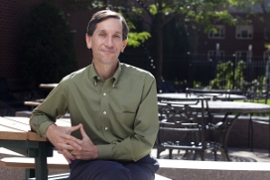Upending Nutrition Roadblocks
By Julie Flaherty
William Masters uses economic theory to improve agriculture and diet in Africa

“In medicine, it’s often one disease, one cure,” says William Masters. “In agriculture, that’s almost never the case." Photo: Kelvin Ma
You walk into a grocery store and are presented with a choice: Do you pick the $5 box of heavily advertised cereal or the no-name brand with the $1 price tag? What if your child’s life depended on your decision?
In many developing countries, parents rely on infant cereals—high-density sources of fats and proteins—to complement breastfeeding for their children from about ages six months to two years. Expensive, well-recognized brands like Cerelac, which is put out by Nestlé, dominate the market, even though locally produced products developed by public service agencies contain roughly the same nutrients and cost as little as one fifth the price.
William A. Masters, a professor at the Friedman School of Nutrition Science and Policy, theorizes that parents shell out for the brand-name product, even if it means they can’t afford to buy as much as their children actually need, in part because they have no way of judging for themselves the nutritional quality of what’s inside. “They have no choice but to rely on advertising, price and packaging to decide which products to trust,” he says.
The remedy, he says, is certification. In 2001, he conducted experiments at various marketplaces in the West African nation of Mali in which mothers were offered a free package of Cerelac. They were then asked how much of a less-familiar—but tested—product they would be willing to trade it for, which revealed the price they would pay for products that had been given a “seal of approval.”
Having a third party do the testing is important, Masters says, to gain the trust of both buyers and sellers. Factoring in the additional cost of a certification program, he estimated that introducing quality assurance could help parents save about $20 per year per child, enough to buy each child an extra month’s worth of food.
This year, Masters and colleagues at the University of Ghana took the first steps toward developing an infant food certification program in that country, where malnutrition stunts the growth of 28 percent of children under age five.
“Certification would help local producers meet infants’ needs at much lower cost, which would go a long way towards solving the country’s nutrition problems,” says Masters, who joined the faculty of the Friedman School’s food policy and applied nutrition program last summer after nearly 20 years at Purdue University, where he was associate head of the Department of Agricultural Economics.
Endless Opportunities
Masters’ research uses economics to improve food systems, especially in Africa. While his focus has been on markets and trade, he has recently been looking at innovation and information.
In Ethiopia, for example, he is exploring whether giving prizes to innovators who introduce improved farming techniques would “put into sharp relief what’s worked and what hasn’t” and spur agricultural advances. More specifically, he is looking at whether proportional prizes—where winners would be paid according to how big an impact their methods have, rather than the more common “winner-take-all” approach—would encourage more people to take part and capture a wider range of ideas.
Improving Ethiopia’s food system will take innovations both big and small, Masters says. “In medicine, it’s often one disease, one cure,” he says. “In agriculture, that’s almost never the case, so we need to keep looking for incremental improvements to suit each specific problem. There are endless opportunities to make a difference.”
Masters’ research on infant foods and on new farming techniques both draw on the economic theory of asymmetric information, in which one party in a transaction has more information than another. “The economic theory is pretty well developed,” he says. “The question is how that plays out in agriculture and nutrition. Solving food problems requires a lot of fieldwork to learn how nature has set the rules.”
In the coming years, Masters and his Friedman School colleagues will have a lot of fieldwork opportunities. In October they were awarded a five-year, $15 million grant from USAID for research on how to improve nutrition in Asia and Africa. Masters will direct the work in Africa. “The project involves all kinds of scientists,” he explains. “That’s good—the natural systems involved are really complicated. Sometimes the economics is the easy part.”
A version of this story first appeared in the Winter 2010 Tufts Nutrition magazine.
Julie Flaherty can be reached at julie.flaherty@tufts.edu.
